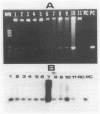Abstract
Genomic amplification by the polymerase chain reaction (PCR) was used to identify a unique genomic sequence of Ehrlichia risticii directly in DNA isolated from peripheral-blood buffy coat cells of E. risticii-infected horses (Potomac horse fever) and from infected cell cultures. A specific primer pair, selected from a cloned, species-specific, 1-kb DNA fragment of the E. risticii genome as a template, was used for the amplification of the target DNA of 247 bp. The optimal number of 40 PCR cycles, determined by analyzing an amplification profile obtained with a constant Taq polymerase concentration, was used to achieve maximum amplification of the E. risticii DNA segment. Efficient amplification of target DNA was achieved with specimens processed by either the phenol extraction or rapid lysis method. The specificity of the amplified DNA product was confirmed by the proper size (247 bp) and appropriate restriction enzyme cleavage pattern of the amplified target DNA, as well as by the specific hybridization signal obtained by using a PCR-amplified 185-bp internal DNA probe. A 10(5)- to 10(6)-fold amplification of target DNA, which allowed detection of E. risticii from as few as two to three infected cells in culture and from a very small volume of buffy coat cells from infected horses, was achieved. This PCR amplification procedure was found to be highly specific and sensitive for the detection of E. risticii for the study of Potomac horse fever.
Full text
PDF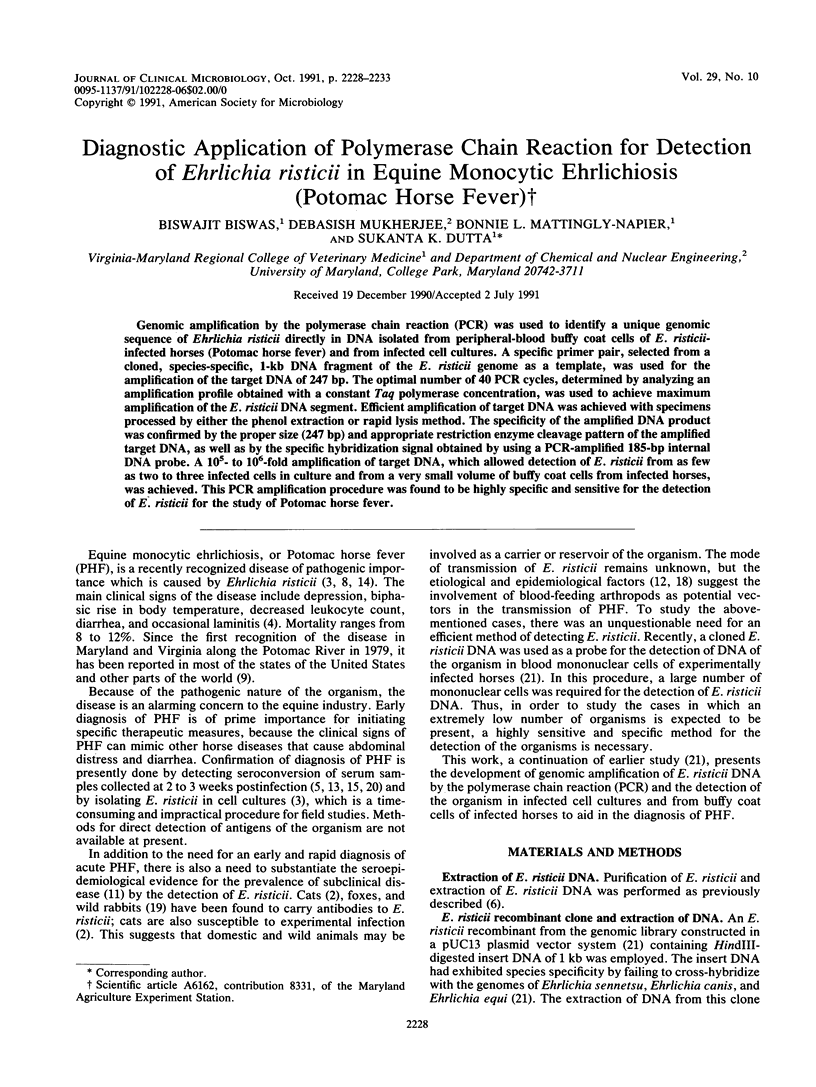
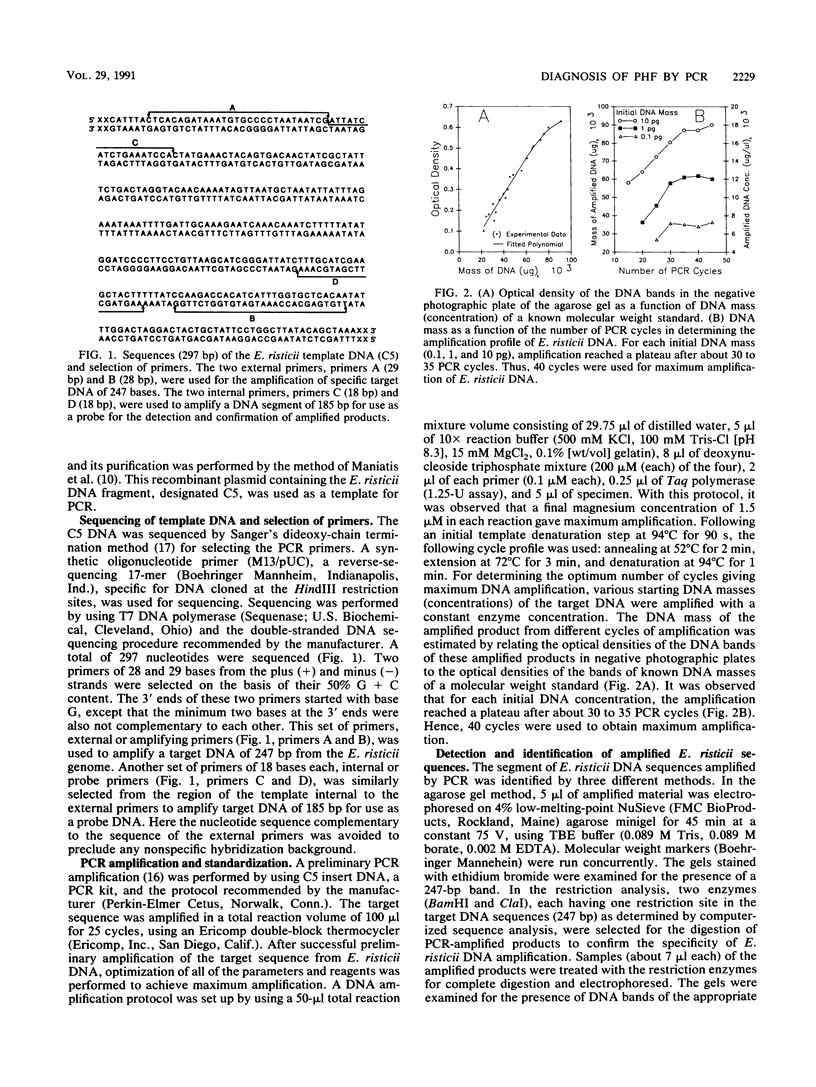
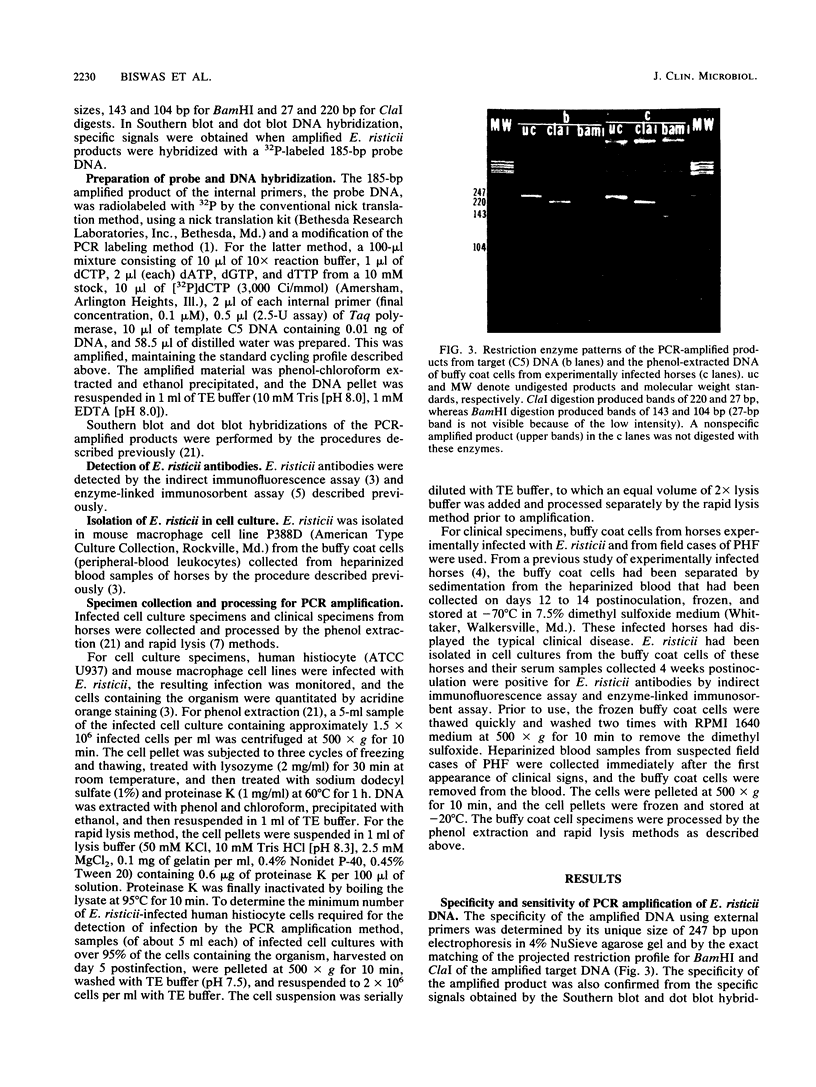
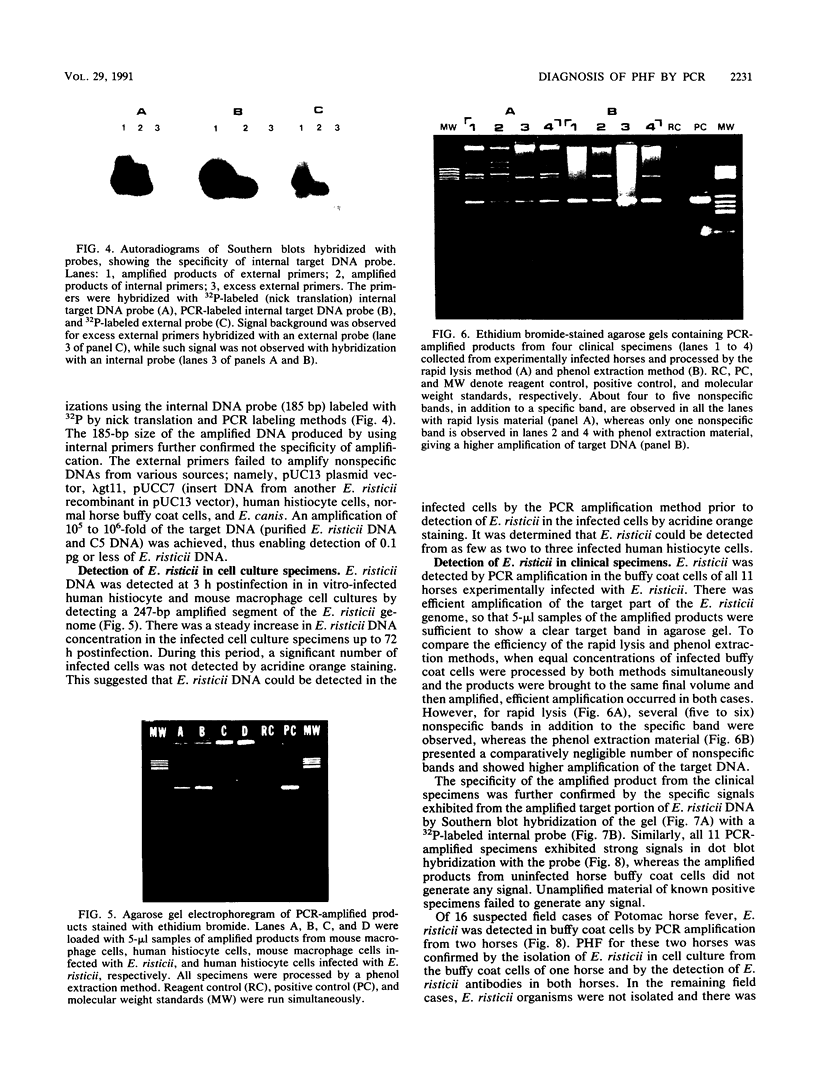
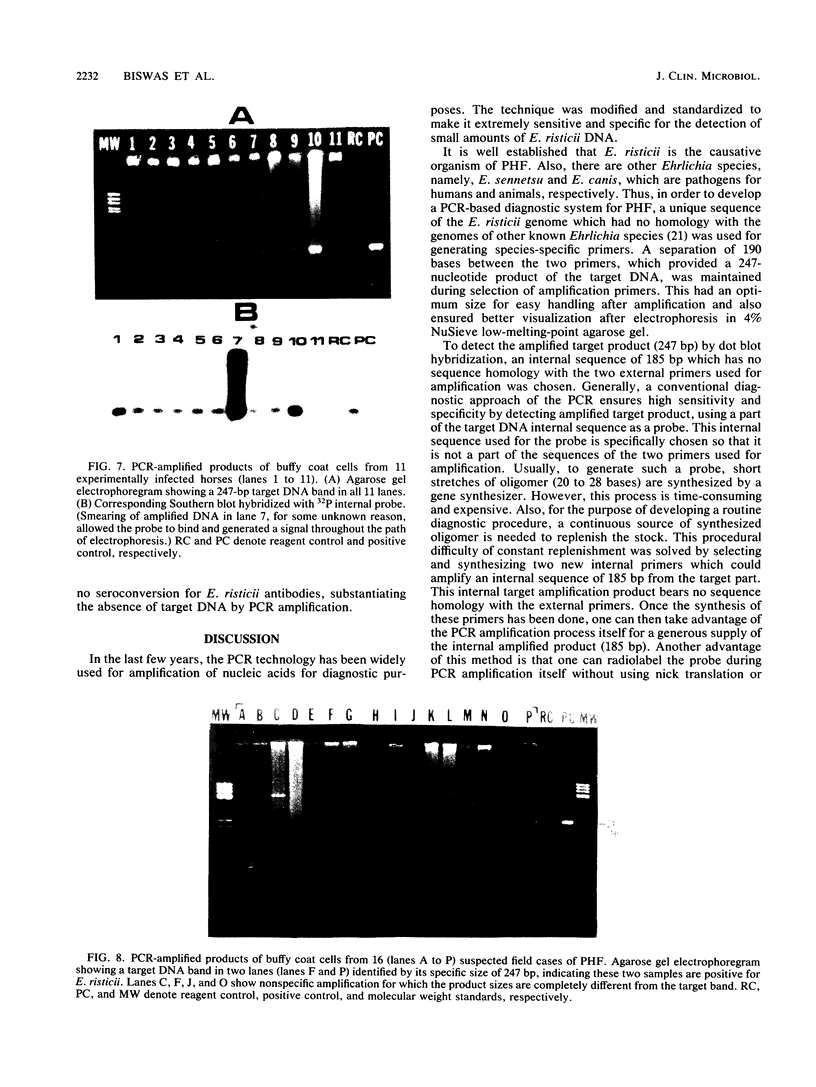
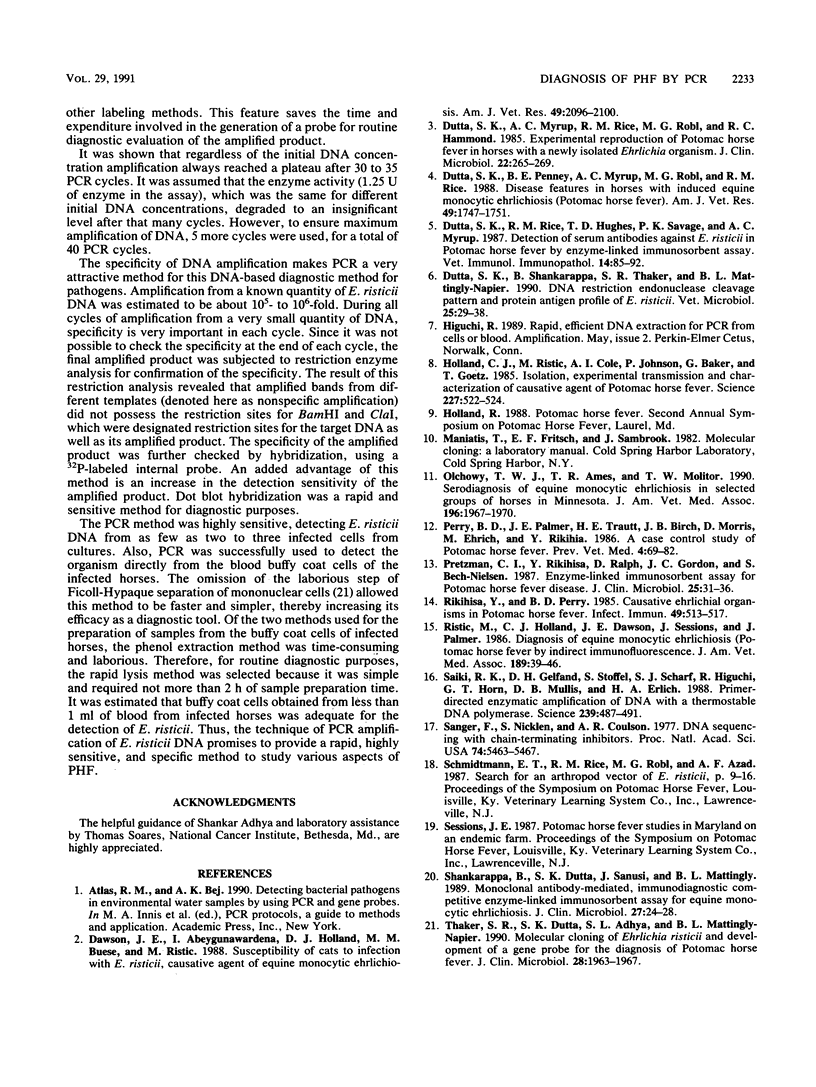
Images in this article
Selected References
These references are in PubMed. This may not be the complete list of references from this article.
- Dawson J. E., Abeygunawardena I., Holland C. J., Buese M. M., Ristic M. Susceptibility of cats to infection with Ehrlichia risticii, causative agent of equine monocytic ehrlichiosis. Am J Vet Res. 1988 Dec;49(12):2096–2100. [PubMed] [Google Scholar]
- Dutta S. K., Myrup A. C., Rice R. M., Robl M. G., Hammond R. C. Experimental reproduction of Potomac horse fever in horses with a newly isolated Ehrlichia organism. J Clin Microbiol. 1985 Aug;22(2):265–269. doi: 10.1128/jcm.22.2.265-269.1985. [DOI] [PMC free article] [PubMed] [Google Scholar]
- Dutta S. K., Penney B. E., Myrup A. C., Robl M. G., Rice R. M. Disease features in horses with induced equine monocytic ehrlichiosis (Potomac horse fever). Am J Vet Res. 1988 Oct;49(10):1747–1751. [PubMed] [Google Scholar]
- Dutta S. K., Rice R. M., Hughes T. D., Savage P. K., Myrup A. C. Detection of serum antibodies against Ehrlichia risticii in Potomac horse fever by enzyme-linked immunosorbent assay. Vet Immunol Immunopathol. 1987 Jan;14(1):85–92. doi: 10.1016/0165-2427(87)90077-8. [DOI] [PubMed] [Google Scholar]
- Dutta S. K., Shankarappa B., Thaker S. R., Mattingly-Napier B. L. DNA restriction endonuclease cleavage pattern and protein antigen profile of Ehrlichia risticii. Vet Microbiol. 1990 Oct;25(1):29–38. doi: 10.1016/0378-1135(90)90090-i. [DOI] [PubMed] [Google Scholar]
- Holland C. J., Ristic M., Cole A. I., Johnson P., Baker G., Goetz T. Isolation, experimental transmission, and characterization of causative agent of Potomac horse fever. Science. 1985 Feb 1;227(4686):522–524. doi: 10.1126/science.3880925. [DOI] [PubMed] [Google Scholar]
- Olchowy T. W., Ames T. R., Molitor T. W. Serodiagnosis of equine monocytic ehrlichiosis in selected groups of horses in Minnesota. J Am Vet Med Assoc. 1990 Jun 15;196(12):1967–1970. [PubMed] [Google Scholar]
- Pretzman C. I., Rikihisa Y., Ralph D., Gordon J. C., Bech-Nielsen S. Enzyme-linked immunosorbent assay for Potomac horse fever disease. J Clin Microbiol. 1987 Jan;25(1):31–36. doi: 10.1128/jcm.25.1.31-36.1987. [DOI] [PMC free article] [PubMed] [Google Scholar]
- Rikihisa Y., Perry B. D. Causative ehrlichial organisms in Potomac horse fever. Infect Immun. 1985 Sep;49(3):513–517. doi: 10.1128/iai.49.3.513-517.1985. [DOI] [PMC free article] [PubMed] [Google Scholar]
- Ristic M., Holland C. J., Dawson J. E., Sessions J., Palmer J. Diagnosis of equine monocytic ehrlichiosis (Potomac horse fever) by indirect immunofluorescence. J Am Vet Med Assoc. 1986 Jul 1;189(1):39–46. [PubMed] [Google Scholar]
- Saiki R. K., Gelfand D. H., Stoffel S., Scharf S. J., Higuchi R., Horn G. T., Mullis K. B., Erlich H. A. Primer-directed enzymatic amplification of DNA with a thermostable DNA polymerase. Science. 1988 Jan 29;239(4839):487–491. doi: 10.1126/science.2448875. [DOI] [PubMed] [Google Scholar]
- Sanger F., Nicklen S., Coulson A. R. DNA sequencing with chain-terminating inhibitors. Proc Natl Acad Sci U S A. 1977 Dec;74(12):5463–5467. doi: 10.1073/pnas.74.12.5463. [DOI] [PMC free article] [PubMed] [Google Scholar]
- Shankarappa B., Dutta S. K., Sanusi J., Mattingly B. L. Monoclonal antibody-mediated, immunodiagnostic competitive enzyme-linked immunosorbent assay for equine monocytic ehrlichiosis. J Clin Microbiol. 1989 Jan;27(1):24–28. doi: 10.1128/jcm.27.1.24-28.1989. [DOI] [PMC free article] [PubMed] [Google Scholar]
- Thaker S. R., Dutta S. K., Adhya S. L., Mattingly-Napier B. L. Molecular cloning of Ehrlichia risticii and development of a gene probe for the diagnosis of Potomac horse fever. J Clin Microbiol. 1990 Sep;28(9):1963–1967. doi: 10.1128/jcm.28.9.1963-1967.1990. [DOI] [PMC free article] [PubMed] [Google Scholar]







